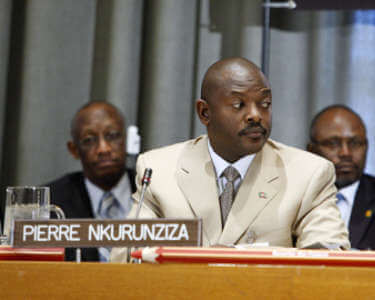
In an exclusive interview with Charisma after the meeting, President Pierre Nkurunziza said several hundred schools have been built so far without aid from Western governments, China or Muslim nations. The Burundi government provided the materials, with some assistance from Christian ministries such as Aid for the World in New York. The Burundi people constructed the schools.
“All Burundians had to engage in community work,” Nkurunziza said. “Every Saturday they came together to help build these schools.”
In addition to expanding access to education, Nkurunziza’s government offers free medical care for pregnant women and children under age 5 to help reduce the nation’s child and infant mortality rate.
The education and health-care projects are part of Nkurunziza’s efforts to bring reconciliation and development in a nation where some 300,000 people died during a 12-year civil war between the minority Tutsis and the majority Hutus.
Elected with 92 percent of the vote in 2005, the year the war ended, Nkurunziza negotiated a historic peace agreement in 2006 and arranged for the Hutu rebels he once led to be employed by the national army to foster unity.
Having completed four years in office, Nkurunziza, who is Hutu, is a rarity. The nation’s previous presidents were all assassinated within months of taking office.
“God was with me during the war,” Nkurunziza said. “I said to my people, ‘If you want to kill me you can try, but God is protecting me.'”
Nkurunziza’s father, a former Member of Parliament, was massacred by Tutsis in 1972, and he later lost five of his siblings during the war. In 1994, while Nkurunziza was teaching at a university in Burundi, Tutsis came onto the campus and began killing Hutus. He escaped with some of his students to the bush, where he lived for the next 10 years.
He joined the guerilla movement in 1996 and became its leader in 2000. Now known as the Forces for the Defence of Democracy, the guerilla group later became the political party that nominated Nkurunziza for president.
Although he attended an Anglican school, Nkurunziza said he became born-again in 1997 after receiving a Bible from a rural minister. ” I started reading the Bible from beginning to end,” he said. “When I finished, I got saved. That’s it.”
He began leading other rebel combatants to Christ and said God spared his life after a near-fatal shooting. He hid without anyone to care for his wounds for four months, and when he returned to his troops-miraculously alive-he told them they would have to put God first in their movement if he were to remain their leader.
“They said, ‘Who did this?'” Nkurunziza recalled, referring to his miraculous survival. “I say, ‘God because I have no doctor here. So if you want me to lead your movement now, you must understand that I put God in first place in your movement. … If you can’t accept that, I cannot lead you.
“From that time in our political party until now, God occupies the first place. Everything we do we start by praying and end by praying because we have to remember to put God before everything.”
Nkurunziza plans to run for re-election in 2010 and wants to provide free secondary schooling and build more health clinics.
Each August, the month of his election, the president holds a national crusade to thank God for sparing his life and developing the nation. He said he wants the crusades to cause the Burundian people “to think about God, what God has done for our nation, what God has done during the whole year so that as [we] praise God, He can be with us the next year.”
This year German evangelist Reinhard Bonnke will be among the speakers.
Nkurunziza has a message for the West, too. “We must return to our roots,” he said. “Our roots are the respect and fear of God. … It’s so important that we believe and respect and think that God is our creator, and we must go in His way so He can protect [our generation].”
Read more about Nkurunziza’s testimony and his vision for Burundi in an upcoming issue of Charisma.












































